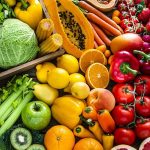 Articles used for food or drink for man or other animals, chewing gum, and articles used for components of any such article (FDA). Material taken into an organism and used for growth, repair, and vital processes and as source of energy.
Articles used for food or drink for man or other animals, chewing gum, and articles used for components of any such article (FDA). Material taken into an organism and used for growth, repair, and vital processes and as source of energy.
Any substance that, when ingested, provides nutrients for the body.
Mixture of substances containing carbohydrate, fat, protein, vitamins, trace elements and water, and consumed by animals, including humans, to provide the necessary nutrients to maintain the body’s metabolism.
Any material, including water, that provides the nutritive requirements of an organism to maintain growth and physical well-being. For people, food includes carbohydrates, fats, proteins, vitamins, and minerals.
Food plays a pivotal role in sustaining life. While plants have the ability to create their own food from minerals, water, and gases present in the air, animals must acquire their sustenance in a pre-made form. In essence, all animals derive their food from plants, although many consume it indirectly by feeding on other animals. The water, minerals, and gases utilized in this process are eventually recycled through respiration, excretion, and decay following death, and are thus made available for the formation of new plants. This ongoing cycle remains constant, and the total amount of food accessible for all life forms on earth remains unaltered. Though humanity has the capacity to regulate and enhance this cycle, the underlying principles and the amount of basic components cannot be altered.
